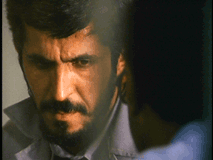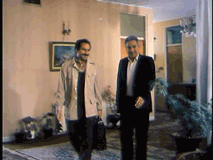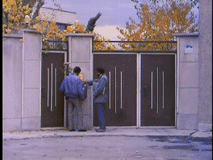Close-Up (Abbas Kiarostami) 1990
 The chain of events that takes place in Abbas Kiarostami’s
fascinating pseudo-documentary Close-Up is presented so that we’re
never quite sure if what we’re seeing is real or a dramatization. That lack of
grounding is thrust upon us, presumably so we can relate to Ali Sabzian, its
subject, who infiltrated the house of a wealthy Teheran family posing as Iranian
film director Mohsen Makhmalbaf. Apparently, Ali was so taken with the beauty of
the sentiments that Mr. Makhmalbaf expressed in his films that, when questioned
by a stranger on the bus about a copy of the screenplay to Makhmalbaf’s The
Cyclist, he claimed to be its author. Before long, it becomes apparent to us
that Ali is delusional, and he lacks the ability, or the willingness, to discern
his fantasy from reality.
The chain of events that takes place in Abbas Kiarostami’s
fascinating pseudo-documentary Close-Up is presented so that we’re
never quite sure if what we’re seeing is real or a dramatization. That lack of
grounding is thrust upon us, presumably so we can relate to Ali Sabzian, its
subject, who infiltrated the house of a wealthy Teheran family posing as Iranian
film director Mohsen Makhmalbaf. Apparently, Ali was so taken with the beauty of
the sentiments that Mr. Makhmalbaf expressed in his films that, when questioned
by a stranger on the bus about a copy of the screenplay to Makhmalbaf’s The
Cyclist, he claimed to be its author. Before long, it becomes apparent to us
that Ali is delusional, and he lacks the ability, or the willingness, to discern
his fantasy from reality.
 Unfortunately, the family of the woman that he met on the bus
doesn’t discover his charade as quickly. Ali, posing as Makhmalbaf, promises
to film his next feature on location in their home, and soon begins visiting the
family regularly, borrowing money from them and staging rehearsals on their
property. Eventually, Ali’s hoax is discovered, resulting in his arrest on
fraud charges, and prompting the media attention that attracted Mr. Kiarostami,
who eventually filmed Ali’s trial. Even more, after the trial, Kiarostami won
the cooperation of the involved parties, so that a recreation of the events that
took place off camera could be filmed. All of these elements make up the core of
Close-Up, but the description of them doesn’t do justice to the fugue
that Kiarostami conducts.
Unfortunately, the family of the woman that he met on the bus
doesn’t discover his charade as quickly. Ali, posing as Makhmalbaf, promises
to film his next feature on location in their home, and soon begins visiting the
family regularly, borrowing money from them and staging rehearsals on their
property. Eventually, Ali’s hoax is discovered, resulting in his arrest on
fraud charges, and prompting the media attention that attracted Mr. Kiarostami,
who eventually filmed Ali’s trial. Even more, after the trial, Kiarostami won
the cooperation of the involved parties, so that a recreation of the events that
took place off camera could be filmed. All of these elements make up the core of
Close-Up, but the description of them doesn’t do justice to the fugue
that Kiarostami conducts.
 The setup of these events it terribly convoluted, but it serves Kiarostami’s
purpose, since he’s attempting to show us that reality is far more complicated
that cinema. The film’s premise becomes a springboard for many philosophical
questions regarding the nature of cinema and its responsibility to those who
watch it. Certainly, the power of the movies was enough to persuade Ali that he
should and could pull off his imitation. The culpability of the press is also
called to attention by these events, since the details that Ali gathered in
order to impersonate Makhmalbaf were obviously gleaned from the ample media
coverage of the director. The glamorous lifestyle that Ali presumed the director
led fueled much of his working-class fantasy. Still, there’s no denying that
the story being told here is a captivating one, and upon realizing that without
the involvement of the journalists that bring it to Kiarostami’s attention, we
wouldn’t be able to enjoy it, we almost feel as if we’ve become implicated
in the crime.
The setup of these events it terribly convoluted, but it serves Kiarostami’s
purpose, since he’s attempting to show us that reality is far more complicated
that cinema. The film’s premise becomes a springboard for many philosophical
questions regarding the nature of cinema and its responsibility to those who
watch it. Certainly, the power of the movies was enough to persuade Ali that he
should and could pull off his imitation. The culpability of the press is also
called to attention by these events, since the details that Ali gathered in
order to impersonate Makhmalbaf were obviously gleaned from the ample media
coverage of the director. The glamorous lifestyle that Ali presumed the director
led fueled much of his working-class fantasy. Still, there’s no denying that
the story being told here is a captivating one, and upon realizing that without
the involvement of the journalists that bring it to Kiarostami’s attention, we
wouldn’t be able to enjoy it, we almost feel as if we’ve become implicated
in the crime.
 By the film’s end, every scene feels like a loaded proposition, daring us to
feel anything, since we’re obviously not capable of simultaneously
understanding all of the angles with which we could examine this case. The film
forces us to run a gamut of emotions in each scene. The humorous exchange in
which we see a bureaucrat launch into a convoluted explanation that he’s
forwarded a requisition to the desk across the room fits snugly against the
mixture of pity and disdain that we feel for Ali. The greatest irony of the film
is that the star-struck family’s initial outrage at being tricked into
thinking they would star in a Makhmalbaf film resulted in an unforeseeable
series of events that culminated in the creation of a Kiarostami film that
co-stars both them and Makhmalbaf. By the end of Close-Up, even the
technical snafus cannot be taken at face value. A microphone that shorts out
seems to provide proof that the cinema is unable to capture every nuance of real
life. One must wonder if it’s only a fortunate coincidence that the events of
the film turned out as they did. That it remains difficult to classify
Kiarostami solely as either a great director or a great journalist at the
film’s end only enhances the film’s power. In either case, Close-Up
is a remarkable achievement, and a potent reminder that no matter what power the
cinema, or any art, might contain, it is powerless without the reality that
informs it.
By the film’s end, every scene feels like a loaded proposition, daring us to
feel anything, since we’re obviously not capable of simultaneously
understanding all of the angles with which we could examine this case. The film
forces us to run a gamut of emotions in each scene. The humorous exchange in
which we see a bureaucrat launch into a convoluted explanation that he’s
forwarded a requisition to the desk across the room fits snugly against the
mixture of pity and disdain that we feel for Ali. The greatest irony of the film
is that the star-struck family’s initial outrage at being tricked into
thinking they would star in a Makhmalbaf film resulted in an unforeseeable
series of events that culminated in the creation of a Kiarostami film that
co-stars both them and Makhmalbaf. By the end of Close-Up, even the
technical snafus cannot be taken at face value. A microphone that shorts out
seems to provide proof that the cinema is unable to capture every nuance of real
life. One must wonder if it’s only a fortunate coincidence that the events of
the film turned out as they did. That it remains difficult to classify
Kiarostami solely as either a great director or a great journalist at the
film’s end only enhances the film’s power. In either case, Close-Up
is a remarkable achievement, and a potent reminder that no matter what power the
cinema, or any art, might contain, it is powerless without the reality that
informs it.
* * * *
4-30-02
Jeremy Heilman